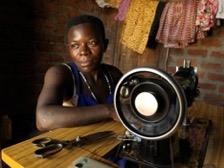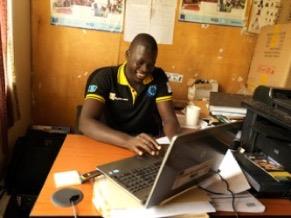Jobs for the most marginalised people with disabilities
- Solution
- Project “Connecting the Dots”
- Organization
- Sightsavers
- Country of Implementation
- United Kingdom
- Region
- Europe
- Subregion
- Western Europe
- Start Year
- 2012
- First published
- 31.01.2017

Solution details
People
“After getting a knitting machine, I will work. I can earn money; I can even get a partner. I can care for my family, and I can help other people.” Mr. Isaac Kirungi, knitting student
“Connecting the Dots” is a project initiated by Sightsavers, a UK-based NGO, and is implemented by its branch in Uganda. “Connecting the Dots” provides individually tailored trainings to unemployed young persons with disabilities, enabling them to participate in the open labour market. Of the 324 project beneficiaries from 2014 to 2016, 254 have subsequently found employment.
Problems Targeted
Most young people in Uganda are ill equipped to enter the workforce. Hence, young women and men with disabilities are further disadvantaged due to lack of accessibility and appropriate skills training.
Solution, Innovation and Impact
The project identifies unemployed young men and women with disabilities in rural districts of Uganda. These young people are from the poorest margins of society and are often illiterate. The project focuses on three main areas: · It supports access to employment through targeted skills development, promoting accessible vocational training institutions and mentorship · It organizes interventions and responds to the specific needs and interests of the participants · For those with severe mobility challenges, they and their families are supported with home- based enterprises Upon graduation, participants receive a start-up kit and mentorship from a local role model. Women’s equitable access is facilitated through targeted support. Most of the young people are self- employed, doing knitting, mechanics, bricklaying, sewing, etc. Some, however, find jobs with local employers, such as in motor garages, carpentry/welding workshops, and barbershops/ salons.
Funding, Outlook and Transferability
“Connecting the Dots” has a cost of approximately US$163,000 per year and is funded by the European Commission. The National Union of Disabled Persons in Uganda, one of Sightsavers’ partners, successfully replicated the project in four additional districts in the country.
Media
Life Story

THE STORY OF ATUGONZA, WORKING FOR SIGHTSAVERS
“Now we are hosting career fairs, putting our work on display.”
I am Atugonza Milton Isaac. When I started school I was the only one with a disability. All the other boys called me by hurtful nicknames, but in my heart I felt, “If others can do it, why not me? Why not a person with a disability?” When the Connecting the Dots project of Sightsavers came to my village I was doing some agricultural work. I heard the news on the radio announcing that the programme was looking for young people with disabilities to take them for training. I had previously had an introduction on how to use a computer, so I said to myself, “Let me study computers, because in the next generation everything will be computerised.” Now my job is to go into the field and monitor the young students in the Sightsavers programme: “How’s the work environment? How are you getting along?” I even go to visit students in their homes to see whether their parents are supporting them or not. I then report back to the office – this one is doing well, this one has a challenge. My mission is to empower youth with disabilities to acquire a sense of self-worth, to see that they too can earn a living, and to lobby for them to know their rights and benefits. I also help them benefit from government programmes, like special grants. I have seen youth with disabilities doing great, great things. Now we are hosting career fairs, putting our work on display. Now everyone knows that disability is not inability!
Related information
- Connections
- 2
-
Organization
- People